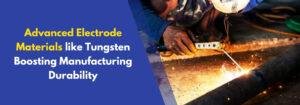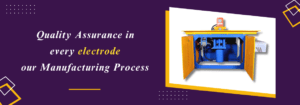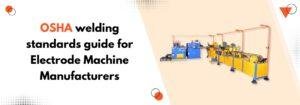Industrial Productivity with Electrode Machine is essential for modern manufacturing, and at the heart of this productivity are electrode making machines. These specialized machines are revolutionizing large-scale industries by ensuring that every electrode produced meets exact quality standards, paving the way for more efficient and reliable production processes.
Introduction
In today’s competitive industrial landscape, productivity is a key driver of success. Manufacturers continuously seek technologies that enhance output while maintaining high quality. Electrode making machines have emerged as a crucial asset for large-scale industries. By automating the production of high-quality electrodes, these machines ensure consistency, reduce manual errors, and significantly improve production speed. This blog delves into how electrode making machines contribute to industrial productivity, highlighting their benefits, real-world applications, and future trends.
The Role of Electrode Making Machines in Industrial Productivity
Electrode making machines are designed to produce electrodes used in various manufacturing processes, particularly in welding and metal fabrication. These machines take raw materials and transform them into precision components that are vital for assembling high-quality products. The production process involves controlled parameters that guarantee the electrode’s consistency in terms of size, composition, and performance. This consistency is essential for industries where even minor deviations can lead to significant quality issues.
By automating the production of electrodes, manufacturers reduce reliance on manual labor, minimize human error, and ensure that every electrode conforms to strict quality standards. This automation not only speeds up production but also allows for large-scale manufacturing without sacrificing product reliability.
Advantages of Electrode Making Machines
Improved Consistency and Quality

One of the primary benefits of electrode making machines is the improved consistency they bring to production. In traditional settings, manually produced electrodes can vary in quality, leading to inconsistencies in the final product. Electrode making machines use precision engineering to ensure that every electrode is produced uniformly, thus enhancing the overall quality of the manufactured goods. This uniformity is critical in industries such as automotive, aerospace, and heavy machinery, where quality control is paramount.
Increased Production Speed

Speed is a vital factor in industrial productivity. Electrode making machines significantly reduce the time required to produce electrodes compared to manual processes. Their automated nature allows for continuous operation, which means that production can scale up without proportional increases in labor or time. Faster production translates into shorter lead times, improved delivery schedules, and ultimately, a stronger competitive edge in the market.
Cost Efficiency and Reduced Waste
Automation through electrode making machines leads to significant cost savings over time. By minimizing manual intervention, companies can reduce labor costs and decrease the likelihood of production errors that result in waste. The precise control offered by these machines ensures optimal use of raw materials, thereby reducing scrap and lowering overall production costs. Moreover, the durability and reliability of modern electrode making machines mean that maintenance costs are predictable and downtime is minimized.
Enhanced Safety and Reduced Manual Handling
Safety is a top priority in large-scale industrial operations. Electrode making machines automate processes that would otherwise require extensive manual handling, thereby reducing the risk of workplace injuries. With fewer workers exposed to potentially hazardous tasks, companies can maintain higher safety standards while also reallocating human resources to more strategic roles such as quality control and process optimization.
Implementation and Integration Strategies
For companies looking to incorporate electrode making machines into their production lines, a thoughtful integration strategy is essential. The process begins with a thorough assessment of current production workflows to identify areas where automation could yield the greatest benefits. Once these areas are identified, companies can plan the layout and integration of electrode making machines to ensure that they complement existing processes without causing disruptions.
Training is a critical component of successful integration. Operators must be well-versed in the functionalities and maintenance requirements of the new machines. Investing in comprehensive training programs not only improves operational efficiency but also helps in early troubleshooting and routine maintenance, ensuring that the machines operate at peak performance.
Regular updates and preventive maintenance are also important to keep electrode making machines running efficiently. By scheduling periodic inspections and incorporating real-time monitoring systems, manufacturers can anticipate potential issues before they escalate, thereby reducing unplanned downtime and ensuring a smooth production flow.
Real-World Applications and Success Stories
Electrode making machines have found widespread application across various industries. In automotive manufacturing, for example, these machines produce electrodes used in welding processes that assemble vehicle frames and body panels. The precision and consistency provided by electrode making machines lead to stronger, more reliable welds, which are critical for vehicle safety and durability.
In the aerospace sector, where the highest quality standards are non-negotiable, electrode making machines ensure that every component used in the manufacturing process meets stringent quality criteria. This attention to detail is crucial for the safety and performance of aircraft components.
Additionally, heavy machinery and construction equipment manufacturers rely on electrode making machines to produce robust electrodes that withstand the rigors of high-stress applications. These success stories underscore how electrode making machines are not only enhancing productivity but also elevating product quality across diverse sectors.
Future Trends and Innovations
The future of electrode making machines is bright, with ongoing innovations poised to further enhance their capabilities. The integration of smart technology, such as IoT sensors and real-time data analytics, is enabling predictive maintenance and continuous process optimization. These advancements will help companies identify inefficiencies early and adjust production parameters on the fly, further boosting productivity.
Sustainability is also a growing focus in industrial manufacturing. Future developments in electrode making machines are likely to emphasize energy efficiency and reduced material waste, aligning with global efforts to minimize environmental impact while maintaining high production standards.
Electrode making machines are transforming industrial productivity by automating the production of high-quality electrodes. Their ability to deliver consistent, precise, and rapid production makes them indispensable in large-scale manufacturing operations. By reducing manual labor, minimizing waste, and enhancing safety, these machines play a crucial role in driving cost efficiency and improving product quality.
As industries continue to evolve, the adoption of advanced electrode making machines will remain a key factor in sustaining competitiveness and meeting the growing demands of modern manufacturing. Companies that invest in these technologies are not only enhancing their current productivity but are also setting the stage for a more innovative and sustainable future.






